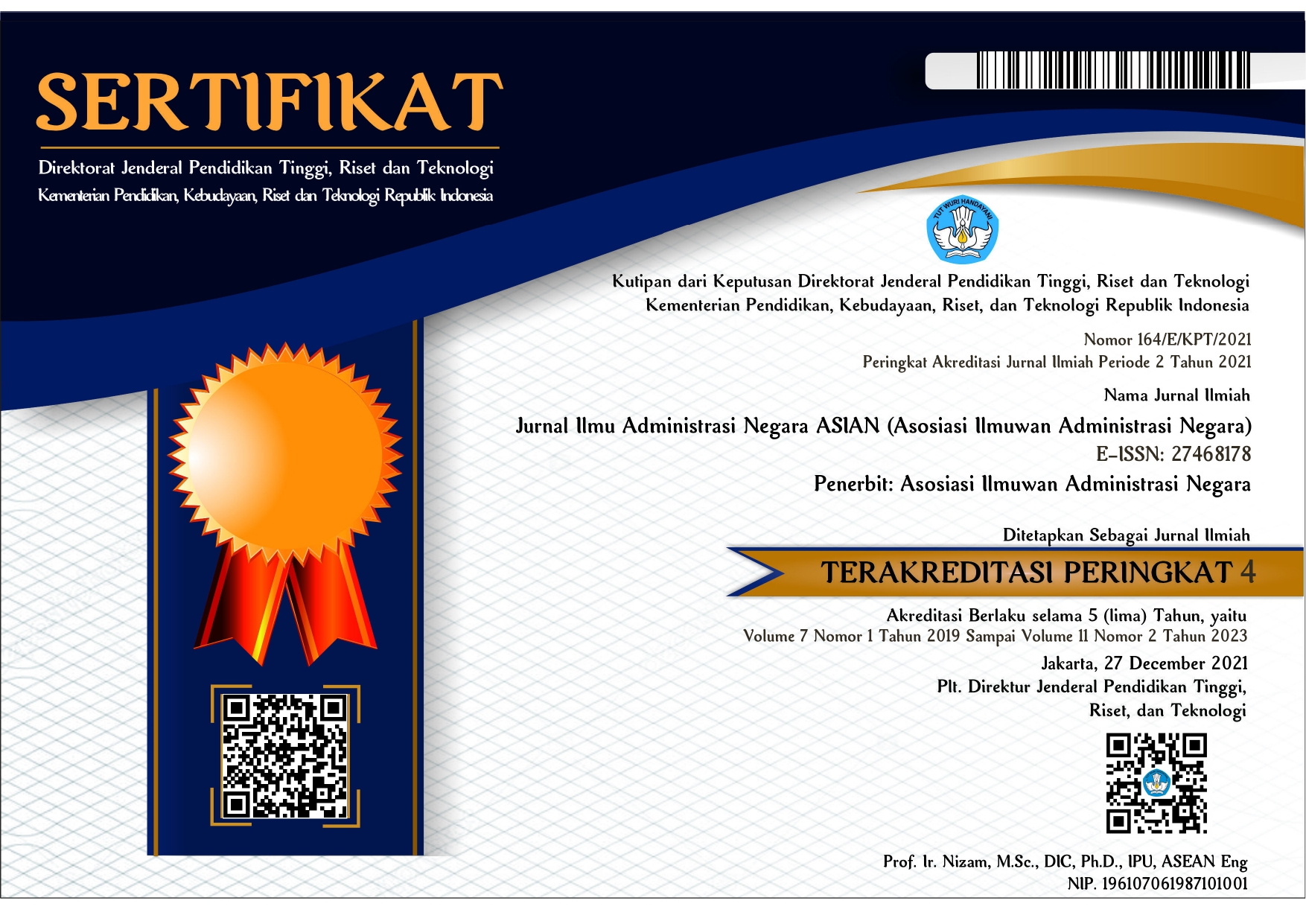Strategi Pengembangan e-Government di Dinas Komunikasi dan Informatika Kota Tanjungpinang
 Abstract views: 860
,
Abstract views: 860
,
 PDF downloads: 1569
PDF downloads: 1569
Abstract
Since 2018 the Tanjungpinang City Government has started developing e-Government. e-Government development efforts are also a target in the 2018-2023 RPJMD of Tanjungpinang City in 2022 with the coordinator are Dinas Communication and Information of Tanjungpinang City . The purpose of this study is to find out how the strategy carried out by the Dinas Communication and Informatics in developing e-Government in the city of Tanjungpinang. The method used in this study was a qualitative descriptive method with 5 informants and data collection techniques and tools in the form of observation, interviews, and documentation with the research locus is Dinas Communication and Informatics Tanjungpinang City. The results of this study using the ITPOSMO theory from Hungger and Whalen are, (1) Information, The state of the Information owned by Diskominfo is by having the official website of the Tanjungpinang city government and SIPA Kominfo, (2) Technology, The state of the technology that exists at Dikominfo is a lack of network capacity, (3) Processes, As for the process carried out in the development of e-Government by providing network capacity and SIPA Kominfo, (4) Objective and Value, the situation to be achieved is the integrity of public services and employment archive, but for now what has started to have integrity is only the employment archive application (5) Staff and Skills. The condition of the staff and also the skills possessed by the Ministry of Communication and Informatics is that they still have incompetent human resources in the ICT field (6) Management and Structure, with the presence of Mayor Number 8 of 2022 and the existence of applications staffing formed by Pemko who are able to provide assistance in carrying out e-Government development in the city of Tanjungpinang (7) Others, the most influential resources are funds and time, Diskominfo is still experiencing a lack of funds due to post-Covid-19 economic recovery which causes all E-Government development efforts are hampered. The conclusion of this study is that the Tanjungpinang City Communications and Informatics Office in developing e-Government does not yet have its own innovative strategy due to unexpected obstacles such as Covid-19.
Downloads
References
Alduraywish, Y., Xu, Y., & Salonitis, K. (2017). Evaluating state of information systems failure in developing countries using ITPOSMO model. 2017 23rd International Conference on Automation and Computing (ICAC), 1–5.
Arief, A., Wahab, I. H. A., & Sensuse, D. I. (2021). Model ITPOSMO untuk Evaluasi E-Government: Tinjauan Studi Kasus. Jurnal Ilmiah Fifo, 13(2), 106–116.
Bastian, I. (2016). Strategi Manajeman Sektor Publik (D. A.Halim (ed.); 1st ed.). Salemba Empat.
Bogdan, R. C. (1982). Qualitative Research For Education; An Introduction to Theory and Methods; Allyn and Bacon.
Chandler, A. (1962). Strategy and Structute : Chapter in The History of the American Industrial Enterprise. MIT Press.
Gunawan, I. (2022). Metode Penelitian Kualitatif: teori dan praktik. Bumi Aksara.
Heeks, R. (2006). Health information systems: Failure, success and improvisation. International Journal of Medical Informatics, 75(2), 125–137.
Irawan, B. (2017). Studi Analisis Konsep E-Government: Sebuah Paradigma Baru dalam Pelayanan Publik. Jurnal Paradigma (JP), 2(1), 174–201.
Itami, H. (1987). Mobilizing Invisible Assets. In harvard University press.
Napitupulu, D., Lubis, M. R., Revida, E., Putra, S. H., Saputra, S., Negara, E. S., & Simarmata, J. (2020). E-Government: Implementasi, Strategi dan Inovasi. Yayasan Kita Menulis.
Pamungkas, A. R., Nugroho, L. E., & Sulistyo, S. (2020). Evaluasi Faktor Kegagalan Sistem Informasi Pada Kesiapan Penerapan E-Government: Studi Literatur. JIKO (Jurnal Informatika Dan Komputer), 3(3), 143–152.
Ramanda, K., Fakriza, M. H., & Palasara, N. D. (2019). Evaluasi Keberhasilan Aplikasi Qlue Menggunakan Model ITPOSMO. Jurnal Sisfokom (Sistem Informasi Dan Komputer), 8(2), 98–104.
Wijanarko, A., Utami, E., & Henderi, H. (2017). EVALUASI KEBERHASILAN WEBSITE PEMERINTAH DAERAH KABUPATEN REJANG LEBONG DENGAN METODE ITPOSMO. Jurnal Ekonomi Dan Teknik Informatika, 4(1), 12–24.
Yudoprakoso, P. W. (2019). Kecerdasan Buatan (Artificial Intelligence) Sebagai Alat Bantu Proses Penyusunan Undang-Undang Dalam Upaya Menghadapi Revolusi Industri 4.0 Di Indonesia. Simposium Hukum Indonesia, 1(1), 450–461.
Copyright (c) 2023 Jurnal Ilmu Administrasi Negara ASIAN (Asosiasi Ilmuwan Administrasi Negara)

This work is licensed under a Creative Commons Attribution-ShareAlike 4.0 International License.
Authors who publish with this journal agree to the following terms:
1. Copyright on any article is retained by the author(s).
2. The author grants the journal, right of first publication with the work simultaneously licensed under a Creative Commons Attribution License that allows others to share the work with an acknowledgment of the work’s authorship and initial publication in this journal.
3. Authors are able to enter into separate, additional contractual arrangements for the non-exclusive distribution of the journal’s published version of the work (e.g., post it to an institutional repository or publish it in a book), with an acknowledgment of its initial publication in this journal.
4. Authors are permitted and encouraged to post their work online (e.g., in institutional repositories or on their website) prior to and during the submission process, as it can lead to productive exchanges, as well as earlier and greater citation of published work.
5. The article and any associated published material is distributed under the Creative Commons Attribution-ShareAlike 4.0 International License








